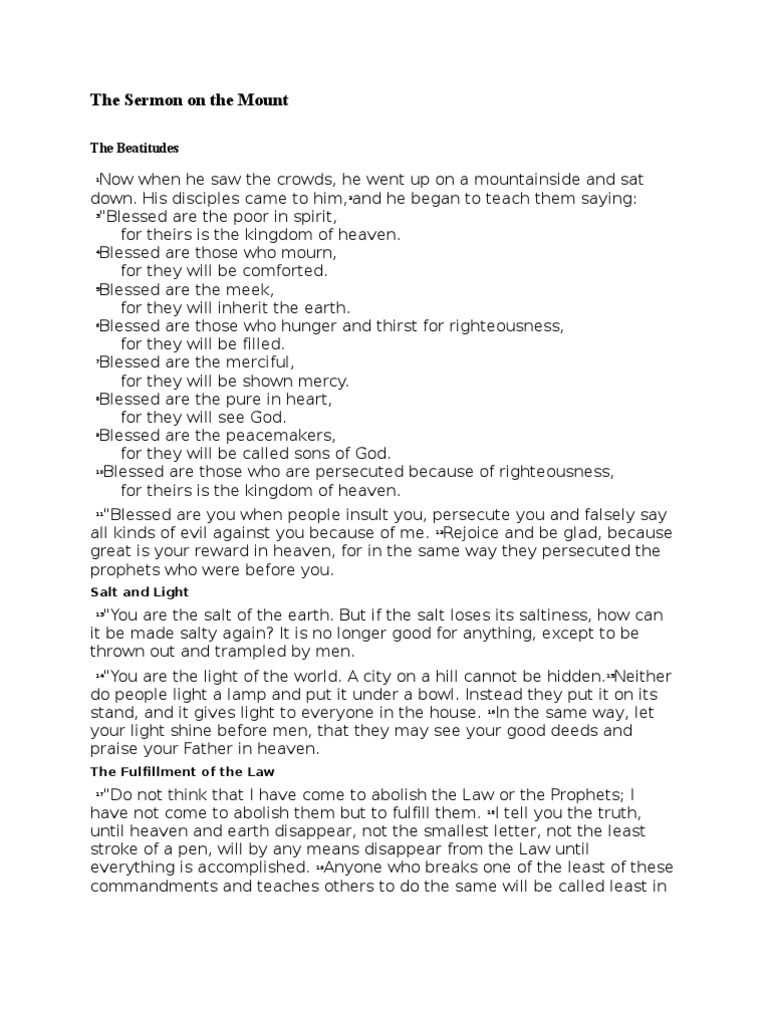The Sermon on the Mount stands as one of the pivotal texts in Christian teachings, often heralded for its profound moral and ethical insights. Comprising chapters 5 to 7 in the Gospel of Matthew, it represents a foundational segment of Jesus’ ministry, wherein He imparts lessons that resonate across various cultures and eras. Below are ten compelling facts about this monumental sermon that reveal its depth and the reasons for its enduring intrigue.
1. Revolutionary Ethics
The Sermon on the Mount introduces a radical ethical framework that challenges conventional wisdom. Jesus subverts societal norms by advocating for love over hatred, forgiveness over vengeance, and humility over pride. The Beatitudes, a set of blessings pronounced at the beginning of the sermon, encapsulate this transformative ethos, highlighting the blessedness of the meek and the persecuted. This inversion of traditional values invites deeper contemplation about the nature of righteousness.
2. The Beatitudes: A Counter-Narrative
The Beatitudes serve not only as declarations of happiness but also as counter-narratives to prevailing societal values. Each Beatitude proclaims blessings on those who are often marginalized—such as the poor in spirit and those who mourn. This emphasis on vulnerability and the exaltation of the lowly elucidates a profound shift in perspective, asserting that true fulfillment often lies outside worldly success. Such resonant themes continue to captivate audiences, encouraging introspection and compassionate engagement with others.
3. The Concept of Peacemaking
Among the most striking assertions in the Sermon on the Mount is the call to be peacemakers. Jesus posits that “blessed are the peacemakers, for they shall be called sons of God.” This invitation transcends mere conflict resolution; it encompasses a holistic pursuit of harmony in relationships, communities, and nations. It compels adherents to pursue justice with humility and encourages actions that foster reconciliation rather than discord. The relevance of this teaching is palpable, especially in a world rife with strife.
4. Radical Love: The Call to Love Enemies
One of the most challenging aspects of the sermon is Jesus’ command to love one’s enemies. In a historical context where retribution was often justified, this extraordinary exhortation prompts profound reflection on the capabilities of human compassion. By advocating for an unconditional love that defies animosity, the sermon champions a transformative approach to interpersonal conflicts, forging pathways towards healing and understanding in divisive situations.
5. The Lord’s Prayer: A Model for Communication with the Divine
Embedded within the sermon is the Lord’s Prayer, a succinct yet powerful template for prayer that resonates deeply with individuals seeking connection with the divine. This prayer embodies fundamental aspects of faith, including reverence, dependency, and communal responsibility. Its brevity belies its significance, offering both instructive words and emotional clarity that has been recited by millions across centuries. The universality of its themes, such as forgiveness and provision, underscores its timeless relevance.
6. A Challenge to Legalism
Jesus navigates the complexities of Jewish law with finesse, asserting that true righteousness extends beyond mere rule-following. His critiques of legalism, grounded in the Sermon on the Mount, emphasize the spirit of the law over its letter. By advocating for internal motives and attitudes—such as anger and lust—as roots of sin, He invites a deeper moral examination. This focus on heart-centric ethics fosters a more profound understanding of both individual and communal integrity.
7. The Golden Rule: An Ethical Imperative
“Do unto others as you would have them do unto you” encapsulates a universal ethical principle known as the Golden Rule. Within the context of the sermon, this succinct guideline possesses the power to foster empathy and promote equitable interactions. The Golden Rule not only serves as a moral compass but also possesses immense potential for societal transformation, advocating for reciprocity and kindness in interpersonal relationships.
8. The Vision of the Kingdom of Heaven
The Sermon on the Mount articulates an expansive vision of the Kingdom of Heaven, characterized by justice, mercy, and righteousness. Jesus outlines the attributes and expectations of citizens within this kingdom, creating a blueprint for communal living that transcends time and borders. This vision invites believers to actively participate in the manifestation of these kingdom values, igniting a sense of purpose and belonging among followers.
9. A Catalyst for Social Justice
The ethical imperatives found in the Sermon on the Mount have historically served as catalysts for social justice movements. Activists and leaders throughout history have drawn inspiration from its teachings to advocate for the oppressed and to challenge systems of injustice. The sermon’s call for compassion and equity continues to resonate in contemporary discussions about human rights and social reform, reflecting its enduring impact on the collective conscience.
10. An Invitation to Discipleship
Ultimately, the Sermon on the Mount functions as an invitation to discipleship. By embodying the principles expressed within it, individuals are encouraged to navigate life with a transformative spirit. This call to active engagement with the teachings is not merely a theoretical exercise but a concrete challenge to live out one’s faith in ways that resonate within families, communities, and beyond. The sermon invites each listener to not only absorb its wisdom but also to implement its values in meaningful and tangible ways.
In sum, the Sermon on the Mount encapsulates profound and multifaceted truths that address the very core of moral and ethical living. Its teachings provoke reflection, cultivate compassion, and inspire action, fostering a legacy that continues to be revered and examined by seekers of truth across the globe.











